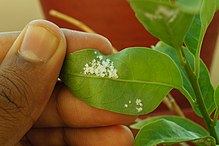Wooly aphids
| Woolly aphids | |
|---|---|
 |
|
| Woolly aphid on jasmine leaf | |
| Scientific classification | |
| Kingdom: | Animalia |
| Phylum: | Arthropoda |
| Class: | Insecta |
| Order: | Hemiptera |
| Suborder: | Sternorrhyncha |
| Superfamily: | Aphidoidea |
| Family: | Aphididae |
| Subfamily: | Eriosomatinae |
| Tribes | |
Woolly aphids (subfamily: Eriosomatinae) are sucking insects that live on plant fluids and produce a filamentous waxy white covering which resembles cotton or wool. The adults are winged and move to new locations where they lay egg masses. The nymphs often form large cottony masses on twigs, for protection from predators. They occur throughout the Northern Hemisphere.
Many of the numerous species of woolly aphids have only one host plant species, or alternating generations on two specific hosts. The woolly apple aphid, Eriosoma lanigerum is a widespread pest of fruit trees, feeding principally on apple, but also, pears, hawthorn, ash, alders, elms and oaks.[1]
In flight they have been described as looking like "flying mice", and are given nicknames like "angel flies", "fluff bugs", "fairy flies", and "ash bugs" "Snow bugs", "Fluffer Fairy", "Poodle Fly","Fluffy Gnats".
The subfamily Eriosomatinae has recently been placed within the family Aphididae. It was previously placed in family Pemphigidae = Eriosomatidae, but that taxon is no longer valid.
Aphidounguis - Byrsocryptoides - Colopha - Colophina - Eriosoma - Gharesia - Hemipodaphis - Kaltenbachiella - Paracolopha - Schizoneurata - Schizoneurella - Siciunguis - Tetraneura - Zelkovaphis
Aloephagus - Aploneura - Asiphonella - Baizongia - Chaetogeoica - Dimelaphis - Forda - Geoica - Geopemphigus - Kaburagia - Melaphis - Nurudea - Paracletus - Rectinasus - Schlechtendalia - Slavum - Smynthurodes - Tramaforda
...
Wikipedia
